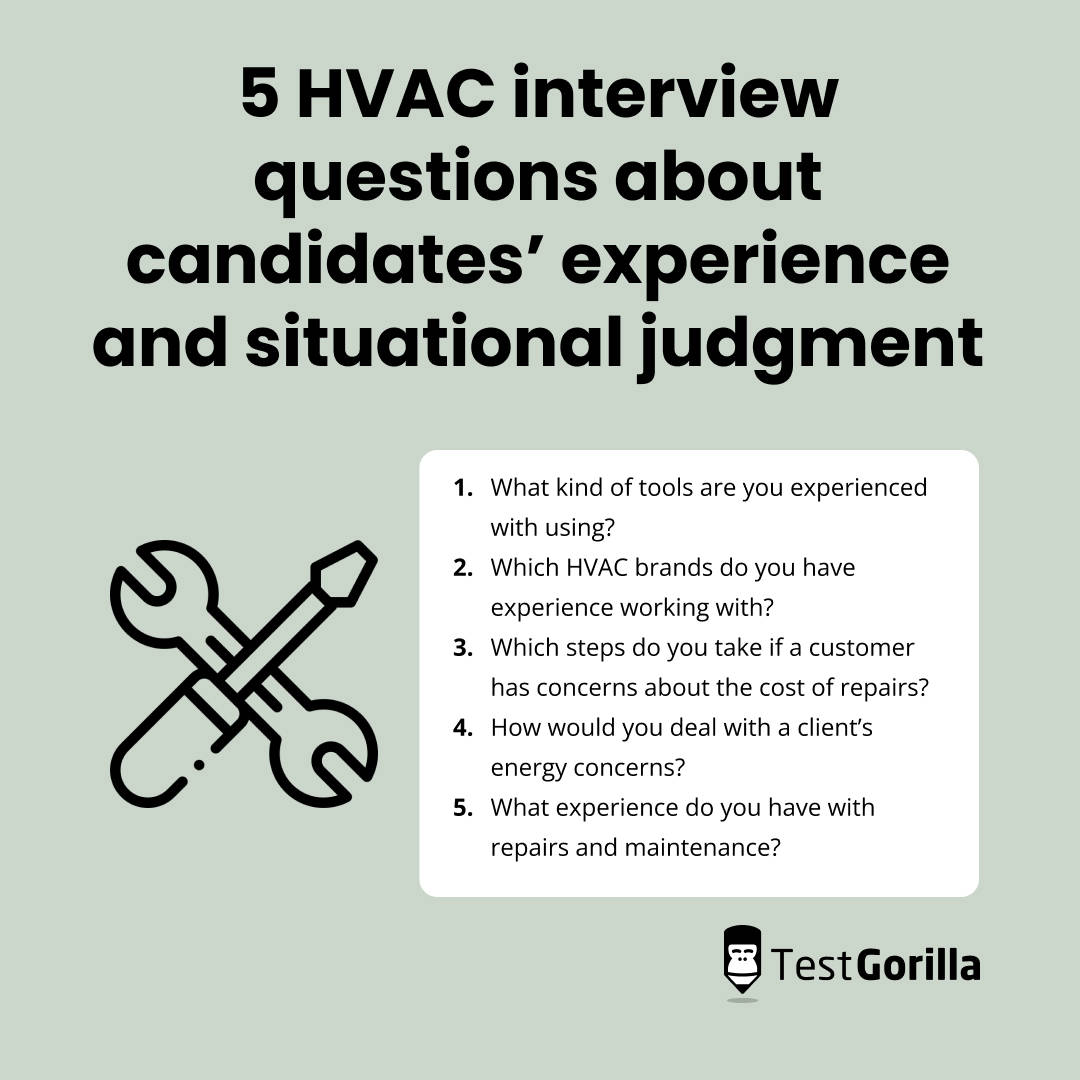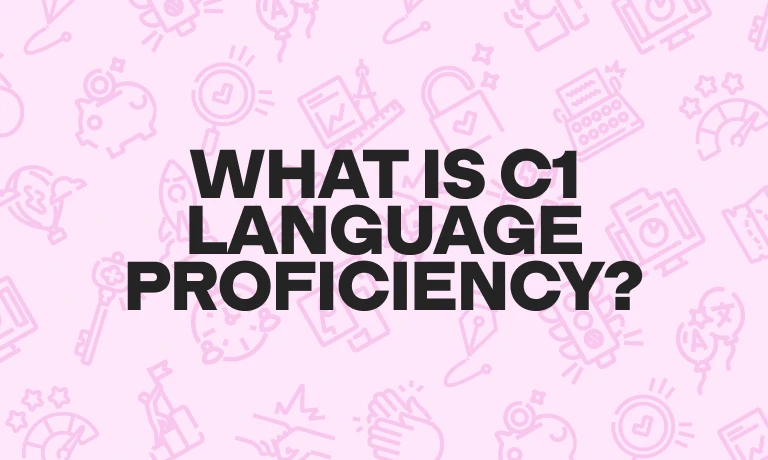41 HVAC interview questions to find your next technician
Many hiring managers must hire for roles they do not fully understand. This is why it is essential to do your research before the interview stage: This enables you to find and ask the right questions to your candidates and select an expert by reviewing their responses.
You can use skills tests to select skilled HVAC candidates to interview. Using a skills test will allow you to narrow down your selection of interviewees based on their results, ensuring you don’t waste time interviewing unsuitable prospects.
To help you maximize the efficiency of your interview process and know what to ask, here are 41 HVAC interview questions to ask your technicians.
Table of contents
- 16 HVAC interview questions to get to know your candidates better
- 5 HVAC interview questions to help you get to know your candidate better with answers
- 10 HVAC interview questions about candidates’ experience and situational judgment
- 5 HVAC interview questions about candidates’ experience and situational judgment
- 15 skills-based HVAC interview questions
- 5 skills-based HVAC interview questions with answers
- When should you ask HVAC interview questions during the hiring process?
- Use HVAC interview questions to hire your next technician
16 HVAC interview questions to get to know your candidates better
When interviewing your candidates, start the interview by familiarizing yourself with the candidate and their experience. Here are 16 questions to help you better understand the HVAC technicians who have applied for your role.
Why did you apply for this position?
What experience do you have with repairs and HVAC systems?
What training have you undergone relating to HVAC systems?
Tell us about the biggest challenge you’ve faced in your career thus far.
Where do you see yourself in 5 years?
How would you approach a situation involving conflict?
Why are you looking for a new job?
What are your salary expectations in this role?
What are your ideal working hours and when are you available?
How do you stay up to date with industry trends in HVAC technology?
What qualities do you find agreeable in a supervisor?
Do you have any other technical skills we should know about?
Do you have a driver’s license?
What drew you to this line of work?
Tell us about a few lessons you have learned while working in maintenance.
What are your greatest strengths?
What are your most significant weaknesses?
Which qualities are essential in an HVAC technician?
Tell me why HVAC systems are essential for business operations.
Tell me about the last time you were praised for your work.
5 HVAC interview questions to help you get to know your candidate better with answers
When you ask these interview questions, you need to know which expert answers to look for from candidates.
Below you can find the sample answers to five of the most essential interview questions to help you get to know your candidates better, along with explanations on why those questions are important.
1. What training have you undergone relating to HVAC systems?
You need to know that your candidate has at least an intimate level of knowledge of HVAC systems and their maintenance. They should have HVAC maintenance certifications which apply to many different brands of air-conditioning units.
Their certificates should be included in their resume, but they should be able to talk about what they mean and the skills they gained from them.
2. How do you approach a situation involving conflict?
Many technicians must deal with conflict between clients and site users daily. Broken equipment can lead to frustration – and sometimes, technicians bear the brunt of this irritation.
So, it’s essential that your technician has a calm manner and can handle conflict well. They should provide examples of what they would do during disputes. A good indicator that they handle conflict well is if they know how to:
Acknowledge the individual’s frustration
Discuss with the individual the plan to fix the system and reassure them
Not engage in any negative attitudes or behaviors
3. What are your salary expectations for this role?
It’s essential to understand what your technician expects in terms of salary. If you have not disclosed the position’s salary, knowing which of your candidates is most affordable (while still having all the skills you need) is a good idea.
If the candidate’s salary expectations are too high, this would indicate that their skillset may exceed the demands of the position.
4. What qualities do you find agreeable in a supervisor?
Your HVAC candidates may need to work with a supervisor when they enter the position. So, ensuring the candidates mesh well with your existing staff and supervisor is essential.
Before the interview, familiarize yourself with your maintenance supervisor’s management style to ensure it aligns with your candidates’ working preferences.
5. Do you have a driver’s license?
In any job interview, it’s essential to know that your new employee can make it to work efficiently. However, some HVAC maintenance roles often require employees to travel between sites to fulfill maintenance requests.
So, you’ll need to know whether your candidate can drive and has a driver’s license that authorizes them to drive a company vehicle. It might also be helpful to ask if the candidate has their vehicle and whether they would be willing to use it to travel between sites.
The best insights on HR and recruitment, delivered to your inbox.
Biweekly updates. No spam. Unsubscribe any time.
10 HVAC interview questions about candidates’ experience and situational judgment
Ask your candidates these 10 HVAC interview questions related to their experience and situational judgment to learn more about how they’d act in specific work-related situations – and whether they have the right knowledge for the role.
What kind of tools are you experienced with using?
Which HVAC brands do you have previous experience working with?
Tell us about your experience with repairs and maintenance.
Tell us about the relevant experience you have for this position.
Tell us about a few lessons you have learned while working in maintenance.
A customer has concerns about the cost of the repairs. Which steps do you take?
How would you deal with a client’s energy concerns?
Do you have experience using mobile technology for HVAC maintenance?
How do you stay motivated as an HVAC technician?
Tell us which qualities make you the best candidate for this position.
5 HVAC interview questions about candidates’ experience and situational judgment
Here are the sample answers for the five important experience-related and situational HVAC interview questions. Use the answers to evaluate your candidates’ response.
1. What kind of tools are you experienced with using?
Knowing that your technician has experience using the right tools for HVAC systems is crucial.
Asking this question will also give you an idea of the extent of their experience: Applicants with extensive knowledge and expertise will have a clear understanding of the tools required to conduct the role’s primary tasks.
If the candidate does not provide a thorough answer, this could be a red flag indicating a lack of experience.
2. Which HVAC brands do you have experience working with?
The best response to this question will include various HVAC brands. If your candidate has only worked with one brand, this knowledge may only apply to some HVAC systems and not others.
Ideally, they should have experience working with many different brands. In that case, they will have an overarching understanding of HVAC systems, allowing them to adapt quickly when working with an unfamiliar brand.
3. A customer has concerns about the cost of the repairs. Which steps do you take?
When a customer disagrees with the cost of repairs, your technician needs to be able to explain the pricing. They should also ensure the customer makes the payment and be firm without harming the relationship.
This is a tricky situation, but the candidate should be able to provide their strategy or give an example of how they resolved a similar issue in the past using their knowledge of customer-relationship management strategies.
4. How would you deal with a client’s energy concerns?
Sometimes, clients will be concerned about their energy bills when installing or buying HVAC systems. In these instances, your technician has to address these concerns and explain the impact a HVAC system would have on their energy consumption and carbon footprint.
They should also give examples of energy-efficient HVAC designs that can reduce energy consumption and provide a more sustainable way of cooling a building.
5. Tell us about your experience with repairs and maintenance.
You might be hiring an HVAC technician with maintenance responsibilities, so it’s essential to understand the full scope of their skill set. If the candidate has many skills beyond HVAC maintenance, you could get a better ROI on your staffing investment. Asking this question is vital to identify any opportunities to expand the role.
Applicants should be able to provide examples of the tools and equipment they are accustomed to using, such as cordless drills, extension cords, and safety equipment.
15 skills-based HVAC interview questions
During the interview, you must ask specific questions regarding the candidate’s skills and approach to the job. You need to know their working style, their HVAC-related skills, and how well they perform under pressure.
Asking more challenging interview questions will provide insight into their social skills and ability to perform and communicate. Here are 15 skills-based HVAC interview questions you can use for this.
What are the key equipment requirements for the role?
Have you had any health and safety awareness training?
What do you do when you realize you don’t have the parts needed to finish a job?
Tell us how you handled your last angry customer.
What challenges do you think you will face as an HVAC technician?
Describe your daily schedule as an HVAC technician.
Name 5 traits that you think are important for this role.
Do you have any additional maintenance skills?
What is the last time you made an error and how did you fix it?
What is VAV, and how does it work?
Explain the common issues you would see with a constant volume system.
Explain the different categories of HVAC systems.
What do you do when you’re running behind schedule?
What do you do to stay up-to-date with technological developments?
What is a condenser in an air-conditioning unit?
What is a rotary air compressor in an air-conditioning unit?
What is a centralized air system?
What is a constant volume system?
What made you want to become an HVAC technician?
What makes you think you would fit our company culture well?
5 skills-based HVAC interview questions with answers
If you’re looking for the right candidate for the job, and lack technical knowledge as a recruiter, you can use our sample answers to technical and skills-based questions to guide you. Here are five skills-based HVAC interview questions with answers.
1. Have you had health-and-safety awareness training?
Health and safety awareness is an essential skill in an HVAC technician candidate. You must find out whether your candidates have received health and safety awareness training, particularly regarding electricity and air conditioning units.
You should ask the candidate about their specific electrical health and safety certifications, ensuring they can handle dangerous situations. The candidate should not be eligible for the position if they don’t have basic health and safety training qualifications.
2. What do you do when you realize you don’t have the parts needed to finish a job?
Your candidates should have a system for retrieving parts when they can’t finish a job without them. Any of the following answers would suit this question:
Place an order for the parts and notify the customer
Retrieve the parts and return at another time
Reschedule later appointments to make time for retrieving parts
The candidate should provide an answer that explains how they plan to retrieve the parts while keeping the customer informed about the situation and ensuring they can complete the job as soon as possible.
3. Tell us about how you handled your last angry customer.
You need an HVAC technician with strong conflict-resolution skills. They should be able to handle the interaction with a disgruntled customer calmly and assertively, taking the following steps to resolve the conflict and maintain the relationship:
Be understanding toward the customer and acknowledge their concern
Offer strategies that solve the problem
Offer compensation for any issues caused
Apologize for the inconvenience
Those or similar conflict-resolution steps will indicate that your candidate knows how to deal with angry customers.
4. Describe your daily schedule as an HVAC technician.
Your ideal candidate should already have a clear picture of what the role will look like. They should also be able to describe the specific duties as an HVAC technician and how they prioritize them.
Time-management skills are essential for maintenance and repair professionals. Your ideal candidate will be able to prioritize tasks in line with their importance and the time needed for each one.
5. What is a condenser in an air conditioning unit?
The air conditioning condenser is the part of the unit that collects hot air or releases it, depending on the temperature. The condenser converts a refrigerant gas back into a liquid to regulate the air temperature.
Your ideal candidate should be aware of each component in an air conditioning unit and its function. If the candidate cannot answer this question, they might have a limited understanding of HVAC systems.
When should you ask HVAC interview questions during the hiring process?
Before inviting candidates to the interview, you should create a shortlist. You can use skills tests to create your shortlist of candidates for the interview. An HVAC skills test will allow you to gauge the knowledge your candidates have and whether it suits your requirements for the role.
From there, you can start interviewing the top-performing candidates to gauge their interpersonal skills and to ask them more about their work ethic. The interview stage is the ideal opportunity to learn about your candidate’s customer service, problem-solving, and workload-management skills.
You can use the above list of HVAC interview questions to create an outline for the interview. The more prepared you are before you begin the interview process, the more questions you will have for your candidates – and the better you’ll be able to assess them.
It can also be helpful to ask your candidates some personality-based questions to understand whether they would be a good addition to your company culture.
Use HVAC interview questions to hire your next technician
The hiring process can be complex if you don’t know which questions to ask. You can create an interview script using the questions in this post so that you’re prepared for the interview, allowing you to get the most out of your candidate.
To begin hiring and create a shortlist of candidates, check out the skills test library we offer at TestGorilla.
Or, if you need to refine your entire hiring process and make it more efficient, you can schedule a free 30-minute demo with our team to see where you stand and what you can do to improve. We are experts in creating efficient hiring processes – and in helping you hire the best candidates quickly and efficiently.
You've scrolled this far
Why not try TestGorilla for free, and see what happens when you put skills first.















